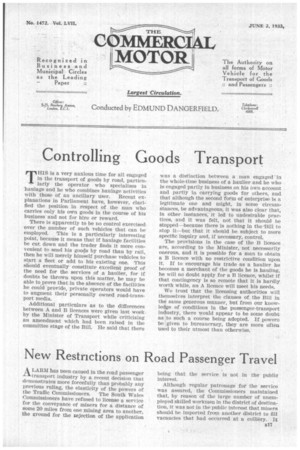Controlling Goods Transport
Page 35

If you've noticed an error in this article please click here to report it so we can fix it.
THIS is a very anxious time for all engaged in the transport of goods by road, particularly the operator who specializes in haulage and he who combines haulage activities with those of an ancillary user. Recent explanations in Parliament have, however, clarified the position in respect of the man who carries only his own goods in the course of his business and not for hire or reward.
There is apparently to be no control exercised over the number of such vehicles that can be employed. This is a particularly interesting point, because it means that if haulage facilities be cut. down and the trader finds it more convenient to send his goods by road than by rail, then he will merely himself purchase vehicles to start a fleet or add to his existing one. This should eventually constitute excellent proof of the need for the services of a haulier, for if doubts be thrown upon this matter, he may be able to prove that in the absence of the facilities he could provide, private operators would have to augment their personally owned road-transport media.
Additional particulars as to the differences between A and B licences were given last week, by the Minister of Transport while criticizing an amendment which had been raised in the committee stage of the Bill. He said that there was a distinction between a man engaged 'in the whole-time business of a haulier and he who is engaged partly in business on his own account and partly in carrying goods for others, and that although the second form of enterprise is a legitimate one and might, in some circumstances, be advantageous, it was also clear that, In other instances; it led to undesirable practices, and it was felt, not that it should be stopped—because there is nothing in the 'Bill to stop it--but that it should be subject to more specific inquiry and, if necessary, control.
The provisions in the case of the B licence are, according to the Minister, not necessarily onerous, and it is possible for a man to obtain a B licence with no restrictive condition upon it. If to encourage his trade as a haulier he becomes a merchant of the goods he is hauling, he will no doubt apply for a B licence, whilst if that contingency is so remote that it is hardly worth while, an A licence will meet his needs.
We trust that the licensing authorities will themselves interpret the clauses of the Bill in the same generous manner, but from our knowledge of conditions in the passenger-transport industry, there would appear to be some doubt as to such a course being adopted. If powers be given to bureaucracy, they are more often used to their utmost than otherwise.




































































































